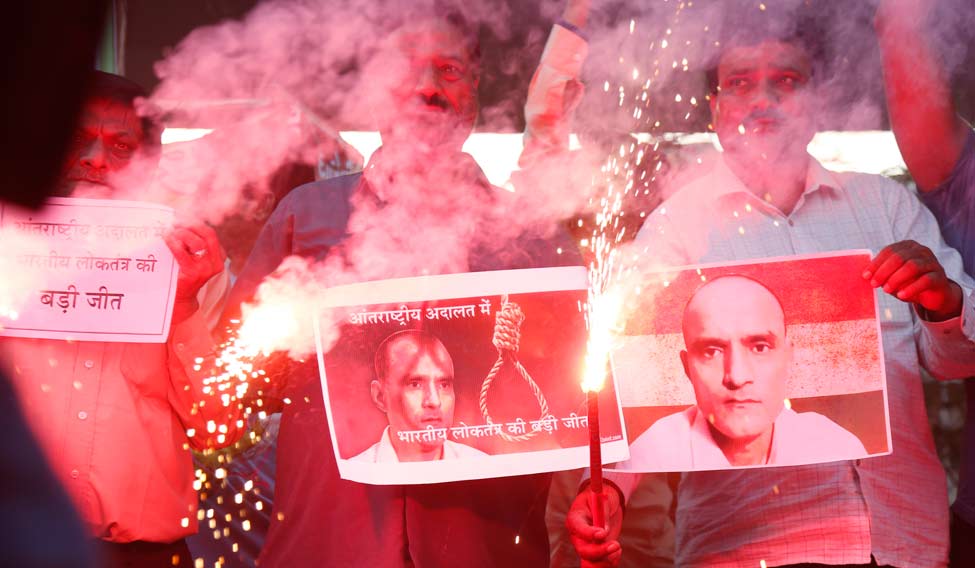It is an important battle won. The war, however, is on. India got more than it had hoped for at the International Court of Justice. Hoping to get a provisional stay on the hanging of former Indian Navy officer Kulbhushan Jadhav, India was in for a pleasant surprise at the utterances of the President of the ICJ, Ronny Abraham, who noted the “urgency'' in ordering the stay.
Abraham pointedly noted that Pakistan had said that there was no likelihood of the execution till August 2017, which “suggested that the execution could happen any moment after that date''. Abraham also said that the arguments [by Pakistan] that Jadhav could petition for clemency and that the date of the execution was not fixed were not enough, and emphasised that there was an urgency in ordering the stay.
There is jubilation in the Indian camp at present with a lot of back thumping. The ministry of external affairs spokesperson Gopal Baglay termed the ICJ order as “unanimous, favourable, unambiguous and clear.'' External affairs minister Sushma Swaraj lost no time in tweeting: “I assure the nation that under the leadership of Prime Minister Modi, we will leave no stone upturned to save Kulbhushan Jadhav.”
Baglay termed the development as an “essential first step in ensuring justice for Jadhav. We hope it will remedy the egregious violations on Jadhav and violations of international conventions by Pakistan.''
India, however, knows that there is a long road ahead, and not every turn could be as favourable as this. India has not just bought time for Jadhav with the quick move to the ICJ, it has also established that Pakistan's actions were in violation of the Vienna Convention. Indeed, with Abraham pointing out that the Convention overrides bilateral agreements as long as both countries remain signatories to it, and that the convention does not exclude persons accused of espionage and terror, Pakistan's entire arguments at the hearing were demolished.
The court has also ordered Pakistan to indicate the measures it will take to ensure Jadhav's safety till the final disposal of the case and also to inform the court about these measures. Given that Pakistan agreed to participate in the hearing, it will now find itself bound to follow the directives of the court, too.
Pakistan has sought to save face with some bluster. In a craftily worded statement, the office of the Attorney General of Pakistan said that “the provisional measures [for ensuring Jadhav is not executed before the case is decided] are a procedural process...These measures have no bearing whatsoever on the final decision of the Court.... The Court's decision today has not changed the status of Commander Jadhav's case in any manner.'' The statement added that Jadhav still has ample time to petition for clemency.
So what is next? The ICJ order on Thursday was only for a provisional stay on Jadhav's execution. India's prayer before the court was also for a declaration that the sentence of the military court was in violation of the Vienna Convention and in defiance of elementary human rights of an accused mandated under the 1996 International Covenant on Civil and Political Rights. It has appealed to the court to direct Pakistan to annul the decision of the military court. If Pakistan is unable to annul the decision, India has appealed to the ICJ to declare the decision as illegal and direct Pakistan to release Jadhav.
As dates for the hearing are announced and the arguments shifted to The Hague, what actions will play out in the subcontinent? The MEA is not sure whether it will make fresh pleas for consular access, given that its 16 pleas so far haven't been withdrawn. “The matter is subjudice,'' said Baglay.
May 19 is the last day for filing an appeal against the sentence. The MEA said it had no idea whether Jadhav was able to file the appeal, given that India had no information on where in Pakistan he is incarcerated.
In the days to follow, how the diplomacy plays out between the two nations could decide on what the fallout of the Jadhav case could have in the subcontinent.






